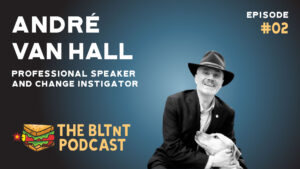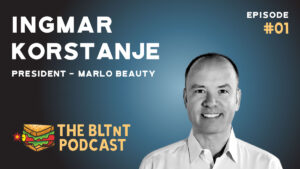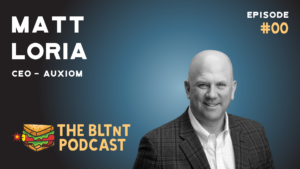Episode 03
Watch Here:
On this “Half a sandwich” episode, Matt shares his opinions of the high points from our past guests and rolls out the red carpet for the interesting guests joining us soon. Watch or listen to his thoughts about Ingmar Kostanje and André van Hall as well as his tee up for conversations with Anthony LaVerde, CEO of Emagine Entertainment, Tony Michaels, CEO of the Parade Company, and Dr. Joel Kahn, world renowned Author, Speaker, and Concierge Cardiologist.
Transcript
(0:00) Hi, I’m Matt Loria, and thanks for joining us for a special edition of the BLTNT podcast.
(0:08) I’m here today to kind of wrap up and chat a little bit about our most recent guests and tell you a little bit about some upcoming guests that we have coming on that we’re going to have some great conversations with.
(0:20) I’m hoping that you’re all enjoying whether you’re listening to or watching full episodes or shorts of our show, and that you’re getting value out of the conversations that you’re seeing.
(0:29) Our guest a couple weeks ago was Ingmar Korstanje, who’s the president of Marlowe Beauty Supply.
(0:37) They’re a beauty supply company that made the transition from a brick and mortar operation primarily to almost fully e-commerce, e-commerce where they’re selling to folks in the beauty industry all across the nation, all the different products that they (0:51) would need to perform their craft.
(0:55) I love that conversation for a few reasons.
Ingmar is such a dynamic guy where he and his wife, one, he and his wife work together.
(1:05) So, the relationship that they have, I’m really inspired by, proud of, all sorts of other positive words that I can think of on that, where they really have divided their responsibilities appropriately between what their strength areas are. And so with Marlowe running the essentially running almost a digital agency inside of the business, and then with Ingmar running the e-commerce platform company and distribution centers.
(1:38) So really cool stuff. So, I hope if you haven’t seen that yet, you can go and tune into that episode.
(1:44) But you know, they also are running a 24 by seven organization.
And I would argue that almost every one of us who’s running an organization today is now a 24 seven operation in some way, shape or form.
(1:59) You know, me in the IT business here, our team, you know, there’s always someone on call 24 seven, there’s always someone working and making sure that things are doing what they’re supposed to do or being there at the ready when something does fail or a bad guy gets into the mix.
(2:16) But you know, running that company and being able to take orders 24 by seven, and to divide the labor among the team among the leadership team to, you know, to be appropriately staffed throughout that time span is really cool stuff.
(2:34) So like I said, if you haven’t tuned into that, please take a listen or take a take a watch of that. I think you’d be really impressed to what they’ve built. The other cool thing that they’ve that Ingmar has done is really kind of almost defined a goal.
And he named that goal and I love it. He calls it the run to 2035.
(2:49) And that is essentially how do I make the company not necessarily bulletproof, but future ready, ready to serve the market as it’s going to blossom and mature into 2035 with all the different technologies that are going to be up and coming that that they’ll be utilizing.
(3:12) And of course, he doesn’t know what those technologies are.
(3:14) So he’s preparing in the best ways that he can possible.
(3:18) So, by building up a really strong ERP system, a system that really runs the company.
(3:26) So the application that runs his company and takes orders and make sure things are shipped appropriately and pulled from inventory appropriately and getting to the clients on time.
(3:38) He’s also done a fantastic job of investing in infrastructure. So, the the stuff that’s behind the walls essentially in the technology world, to make sure that he is future proofing when when the next Wi Fi increase in speed comes in or the next technology needs to run on that on those types of platforms, he’s he’s ready to go.
(3:58) So I also love the fact that he’s named this right name it and claim it. And the run to the run to 2035.
(4:08) We actually did something similar here in our company in Auxiom, which is the race to 100.
Our goal of finding 100 right fit clients for the organization, and we’re getting very close to that.
(4:23) So excited to excited to say that, obviously, we’re in our we’re just into our 10th year here, 10 year anniversary for our company.
(4:27) So it’s exciting to see what we’re what we’re doing here.
But when you name something, you know, it really is something that people can sink their teeth into and they can get behind in a rally cry and, and almost that team chant sort of mentality.
(4:41) So love what you’re doing there, Ingmar and and hope everybody’s getting a chance to watch that.
(4:54) You know, we also had Andre van Hall and what an interesting guy, Andre is Andre, I was able to meet, he was a Vistage speaker, I belong to a Vistage group, which is a CEO peer group, where about 15 to 20 people get together, the same people, typically about every month or 10 times a year, I think is the exact number where we bring in an expert speaker, and then we listen and learn from that person, we have lunch together, and then we do issue processing.
(5:21) So anything that anyone in the group is dealing with, they can they can talk about in a confidential platform, where they’re getting the help of 15 to 20 other people who really care about them, and who have gotten to know them really well, in that room, you know, totally focused on them trying to help them think through a problem and and and perhaps solution that as well.
(5:43) So Andre was one of those expert speakers, and he came into a meeting, and he came in with with a guide dog. So obviously, we were able to tell pretty clearly and pretty quickly that he’s blind.
(5:56) He wasn’t always blind, though, this only happened to him 12 years ago, where one day he woke up and couldn’t see from kind of his neck down in that in that peripheral part of his vision, up and down and went to the doctor and the doctor said, you’re basically going to be blind in two weeks.
(6:14) And so a compulsory, I think was his word, sort of change, you know, he was compelled to make changes in his life, whether he wanted to or not.
(6:25) And, you know, hope, thankfully, not all of us are, are forced with that level of change in our lives, but the way that he embraced it was truly amazing.
(6:34) So, you know, he went from being the CEO and general manager of the Denver Athletic Club, that’s where his career had taken him to at that point in time to shortly after being diagnosed and going through a couple of couple of changes there, he ended up leaving the organization and had to reinvent himself.
(6:54) Well, along that way, before he was even able to reinvent himself, he got cancer.
(7:03) And was was forced to deal with that and go through the treatments and was able to get a life saving exploratory drug or a trial drug that actually worked and actually cured him.
(7:19) So there he was back into the, you know, what am I going to do with myself sort of scenario.
(7:29) And he decided that he was going to be a speaker and never had any experience with that and went and learned how to speak, you know, he tells us stories, (7:33) you’re going to hear some great stories, if you tune into the episode of having to talk to people at nursing homes.
(7:39) So he said they, they would roll people in, they would be asleep, and he would be hearing the beep beep beep of their monitors, but he would be talking to them.
And so that was part of his practice.
So, talk about, you know, sucking up his pride and just getting after it and learning a new skill set. He’s the master of transformations and, and embracing the change and not wallowing in any of the misery that, you know, life was essentially creating for him really great sort of personality, if you will, that he’s kind of built up there of being the, the curiosity instigator.
(8:13) His, his, his thoughts that he shares with leaders about one being curious yourself, but also inspiring a culture of curiosity.
(8:29) That’s not just a culture of curiosity, but it’s a culture of curiosity that inspires the, the employee or the team members to actually then take initiative based on the curiosity that they’ve, that whatever the curious thought was that they had, or the whatever rabbit trail they run down, leverage the curiosity and then make change, use initiative and actually make change.
(8:53) So not just talking about it, not just thinking about it, but doing.
And I think you’re going to really love, love that.
(9:00) You’re going to learn a lot about his, and I learned a lot about the technology that Andre uses.
(9:09) And you’ll see, there’s one part in that episode where we were talking and I was sharing a story that Andre and I had, have had a number of phone calls and Zoom calls and things like that, virtual meetings.
(9:21) And at one point I was having some trouble with my camera. And I said to him, Hey, Andre, how do I look?
(9:25) And he pauses and I’m thinking, why is he pausing?
(9:28) He says, you’re asking a blind man, how do I look? I said, oh my gosh, the technology and the way he leverages the technology, I completely forget that he’s blind.
(9:42) So it’s, it’s a really cool way that you’ve seen him embrace technology and how that’s working to, to give him a really full life from that to driving around in automated cars and everything like that.
(9:53) It’s just, it’s just really awesome stuff. Up and coming.
(9:57) We’ve got a really, really neat guest is Anthony LaVerde, who’s the CEO of Imagine Entertainment, and met Anthony a number of years ago, and help him out with some of some of the technology and security needs that he has.
(10:16) But Anthony’s a really interesting guy, because he’s somebody that wasn’t born ( in the Detroit area, but yet knows everyone here.
(10:26) And he’s just done an amazing job of transforming where he was before, which was on Wall Street, to running a beautiful midsize organization, headquartered here in multiple states.
(10:41) And the relationships that he’s formed are tremendous.
And so guaranteed, he knows more than he knows more people than I know.
(10:52) But, but has been able to make some amazing connections and is always happy to make connections for other people as well.
(11:01) And that’s what I really appreciate about he and and also his, his business partner and chairman, Paul Glantz is that they’ve always, they’re always a pay it forward, sort of group of people and an organization and they also know where to pivot, they, they take risks.
(11:18) And when COVID happened, you know, they, of course, took a couple of really big gut shots with, with the shutdowns and things of that nature.
(11:25) And they figured out a way to survive and thrive and come out even stronger on the other end. So you’re going to love the conversation that we’re going to have there.
(11:38) We’ve got Tony Michaels coming up, and Tony’s the CEO of the Parade Company here in Detroit. So we’re gonna have a little bit of a Detroit theme here for the next few, few episodes. And Tony’s a really interesting guy who also has had a lot of, well, I would say alot of staying power.
(11:57) Started at 14 years old working for Elias Brothers in the warehouse and worked his way all the way up to CEO of the Elias Brothers Big Boy organization. Saw that company through bankruptcy, stayed with it, ran it successfully for another seven or eight years after that.
(12:13) And all the while, you know, staying with that one company and that fortitude and that stick-to-itiveness is really an interesting thing.
(12:25) But what he had to do along the way was really grow, because no one’s going to keep you around if you’re just stagnating.
(12:32) So, he worked his way out of a lot of different jobs, from warehouse worker to director of marketing to eventually becoming the CEO.
(12:40) And then he went on to work for the Parade Company and took what we would all look at as kind ofa more of a community-based organization, which it truly is today as well, but built it into really a great organization that has just been thriving under his leadership.
(13:00) And he’s got a strategy of everything great. And that strategy is, if you make everything great, money follows.
(13:07) And so when you hear him talk about it, you’re just going to be inspired to figure out where you can implement those sorts of, you know, those sorts of attributes and those sorts of little dollops of goodness throughout your own organization.
(13:23) So looking forward to having that conversation with him. And I’m sure I’ll learn a lot more during that time as well.
(13:36) We’re also bringing on Dr. Joel Kahn, and many of you in this area know him, but he’s known kind of all over the world as a vegan cardiologist.
And so he’s a fellow that has went vegan himself years back, met him because my wife has some family history of heart disease.
(13:55) And he was able to see and understand his kind of methodology. And he’s just always been at the forefront of testing.
(14:03) So test, test rather than guess is one of his mantras. But health is wealth. And he’s going to share with us how we have to keep our bodies healthy in order to really be doing the right things for our family and for our organizations.
(14:21) But he’s made some really cool pivot points as well. And so what I really like about Joel, and what I think you’ll like too, is he’s a lot of fun to be around with, first of all.
(14:30) But second of all, is that he does make appropriate pivots.
(14:35) So when he finds out that a data is wrong, he will adjust. Or when he finds out new data, he will adjust. So he’s not like a politician, where they kind of stick with, it’s either red or it’s blue, and it doesn’t matter what anybody else says.
(14:50) He actually goes out and digs, finds out more information, finds out more data, and then makes appropriate decisions, decisions he thinks are appropriate at the time.
(15:00) And so I think you’re going to really enjoy getting to know Joel, as well. I’m getting ready to head out of town.
(15:08) We’ve got some changes happening in my own family here. My brother’s about to have his first natural child. He has a stepson and he’s about to have his first natural child.
So, we’re all excited that we’ve got that big change coming into the world.
(15:25) And so I’m going to go get to meet my new nephew, who’s hopefully arriving any moment now.
(15:30) And we will look forward to serving up more BLTNT to you real soon.
So, thanks for joining me for this special episode.
(15:40) We’ll call this the half a sandwich, maybe, for you. Since there’s no guest, it’s just me and hopefully that fills you up today.
Other episodes we think you'll enjoy:

Episode 02: André Van Hall
André’s journey through personal and professional transformations, from working in the hospitality industry and becoming blind 11 years ago, to becoming an award-winning Vistage speaker.

Episode 01:
Ingmar Korstanje
Ingmar has spent nearly 30 years in all aspects of logistics and distribution ranging from freight brokerage to import export to wholesale and ecommerce distribution.

Episode 00:
Matt Loria
In this inaugural episode, your host Matt Loria, introduces the vision and mission behind the podcast.


